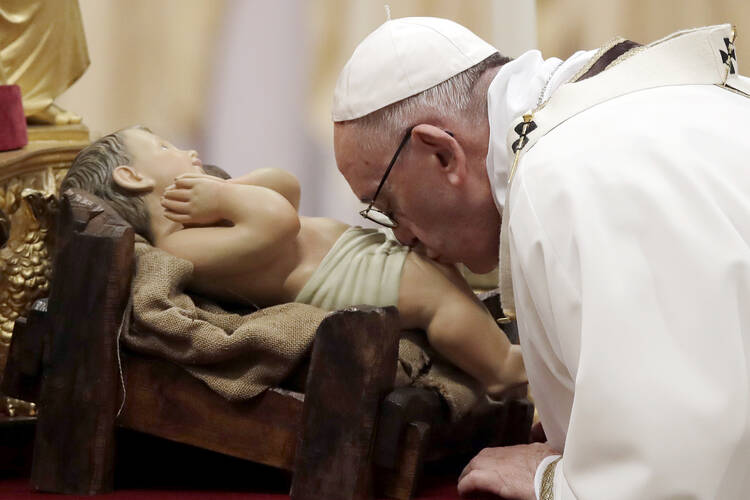Pope Francis in Christmas Eve remarks Sunday likened the journey of Mary and Joseph to Bethlehem to the migrations of millions of people today who are forced to leave homelands for a better life, or just for survival, and he expressed hope that no one will feel “there is no room for them on this Earth.”
Francis celebrated late evening Christmas vigil Mass in the splendor of St. Peter’s Basilica, telling the faithful that the “simple story” of Jesus' birth in a manger changed “our history forever. Everything that night became a source of hope.”
Noting that Mary and Joseph arrived in a land “where there was no place for them,” Francis drew parallels to contemporary time.
“So many other footsteps are hidden in the footsteps of Joseph and Mary,” he said in his homily. “We see the tracks of entire families forced to set out in our own day. We see the tracks of millions of persons who do not choose to go away but, driven from their land, leave behind their dear ones.
“In many cases this departure is filled with hope, hope for the future; yet for many this departure can only have one name: survival,” the pope said.
Referring to the king of Judea who was depicted as a tyrant in the New Testament, Francis continued, saying some migrants are “surviving the Herods of today, who, to impose their power and increase their wealth, see no problem in shedding innocent blood.”
“So many other footsteps are hidden in the footsteps of Joseph and Mary,” Pope Francis said. “We see the tracks of entire families forced to set out in our own day.”
Francis has made concern for economic migrants, war refugees and others on society’s margins a central plank of his papacy. He said God is present in “the unwelcomed visitor, often unrecognizable, who walks through our cities and our neighborhoods, who travels on our buses and knocks on our door.” That perception of God should develop into “new forms of relationship, in which none have to feel that there is no room for them on this Earth,” he said.
“Christmas is a time for turning the power of fear into the power of charity,” Francis said.
Referring to Jesus as the Child of Bethlehem, the pope said that God “invites us to become sentinels for all those bowed down by the despair born of encountering so many closed doors.”
The pope expressed hope that people see Jesus in “all those who arrive in our cities, in our histories, in our lives.”
At the start of the service, Francis bent over to kiss a statue of the baby Jesus in the basilica.
At mid-day Monday, tradition calls for Francis to deliver the Christmas Day message “urbi et orbi”—Latin for “to the city and to the world”—from the central loggia of the basilica overlooking St. Peter’s Square. The speech often is a review of the world events and conflicts.









I'm glad that Pope Francis drew parallels between the Holy Family being migrants and those migrants of today. When I worked in a group home with disabled men, several of my co-workers were immigrants from Liberia. They had fled their homeland to escape a brutal civil war, and to try and attain a new, productive, and satisfying life in our country.